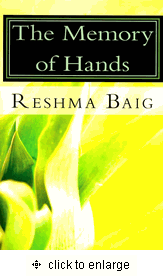The Memory of Hands
3 in stock - Almost gone!
This is a demo store. All images have been sourced from Shutterstock and Adobe stock.
- Delivery time: 3-5 days
- 14 Days Return Policy
- Free Shipping On All Orders Above $50
Description
Description
An excellent collection of short stories centering on the lives of Muslims in urban America as well as on the immigrant Muslim experience. A poetic journey through the Muslim community that holds the prospect for growth and renewal in all of us.
The Memory of Hands is a collection of stories which is at once turbulent and real, sometimes frightening and evocative, but yet so lucid that “you can catch it and hold it for a moment or two in the palm of your hand.” These ten stories by Indian-American author Reshma Baig straddle the worlds of memories, dreams and realities. Told with insight and sensitivity, they intimately explore the oftentimes complicated lives of the Indian immigrant in New York City.
A selection from the book...
Ruby Auntie told me to keep my standards high and my motives true. She is my mother’s youngest sister. Everyone thought she would never marry, so they were all shocked when she said yes to a Pakistani botanist six years ago. My family placed some matrimonial ads in two Muslim magazines, and the proposals came tumbling in. Photos, c.v.’s and E-mail from all corners of the world. I didn't know there were so many single Muslim men out there who wanted “slim, fair skinned girls under 30” from specific cultures. Girls? Funny, I thought I was a woman—or at least a young woman—and my culture is Islam.
Nan’na told Ruby Auntie that she shouldn’t worry that she was not fair skinned. Her prospects were still good since she was still under 30. She was never married, had a Ph.D., was blessed with the advantage of height, had a good job, always wore conservative suits, and on top of it all, spoke fluent Urdu. Nan’na reminded Ruby that our family was well known in the community and that she had specified that only qualified young men need send their proposals.
After Na’na and Nan’na announced to the community that they were seeking proposals for their youngest daughter, Nan’na clamped her hand on the phone every time it rang. Her notebook and pen waited on the kitchen counter like a surgeon’s tools. She picked up the phone with a thoroughly well rehearsed script in mind. Nan’na had it all figured out. Nan’na knew what she had to say and when to weed them out.
As she hung up the phone after speaking with an unlucky suitor, Nan’na said, “I may be an old woman, but I can still tell a decent man by the sound of his voice.” Nan’na suddenly became the Matrimonial Post-master General. With phone in hand, she said that she could discern the First Class proposals from the flimsy Third Class proposals just by the way the men spoke about themselves. She had trained her ears to spot what she called the “discrepancy” in the grainy undercurrent of a man’s voice
Shipping & Returns
Shipping & Returns
Shipping Information:
We offer fast and reliable shipping with tracking to ensure your order reaches you promptly.
Returns Information:
If you're not completely satisfied with your purchase, we accept returns within 30 days for a full refund or exchange.
Couldn't load pickup availability
Pair text with an image to focus on your chosen product, collection, or blog post.
Pair text with an image to focus on your chosen product, collection, or blog post.

Talk About Your Brand
-
Heading
Pair text with an image to focus on your
chosen product, collection, or blog post.
-
Heading
Pair text with an image to focus on your
chosen product, collection, or blog post.
-
Heading
Pair text with an image to focus on your
chosen product, collection, or blog post.
-
Heading
Pair text with an image to focus on your
chosen product, collection, or blog post.
FAQs
Give customers details about the product or content on the template.
Frequently asked question
Pair text with an image to focus on your chosen product, collection, or blog post. Add details on availability, style, or even provide a review.
Frequently asked question
Pair text with an image to focus on your chosen product, collection, or blog post. Add details on availability, style, or even provide a review.
Frequently asked question
Pair text with an image to focus on your chosen product, collection, or blog post. Add details on availability, style, or even provide a review.
Frequently asked question
Pair text with an image to focus on your chosen product, collection, or blog post. Add details on availability, style, or even provide a review.
Testimonials
Testimonial
"Add customer reviews and testimonials to showcase your store’s happy customers."
Author Name
Testimonial
"Add customer reviews and testimonials to showcase your store’s happy customers."
Author Name
Testimonial
"Add customer reviews and testimonials to showcase your store’s happy customers."
Author Name
Recently Viewed
Heading for Social Images
Follow Us
Sign Up to the Newsletter
Add descriptive text to invite your users to sign up for your newsletter.

The Memory of Hands

